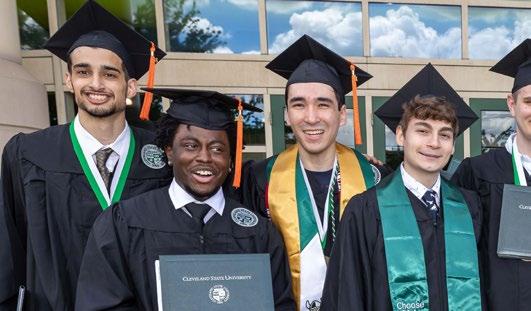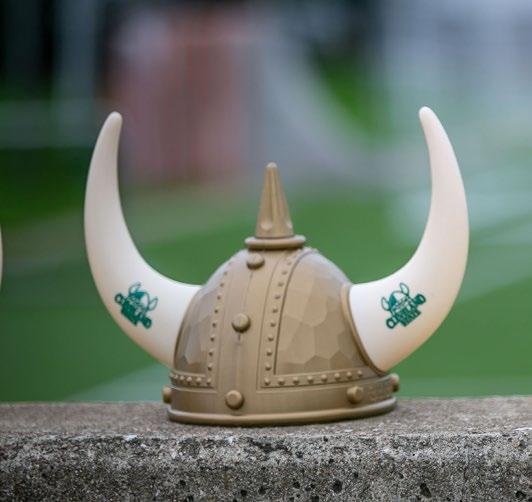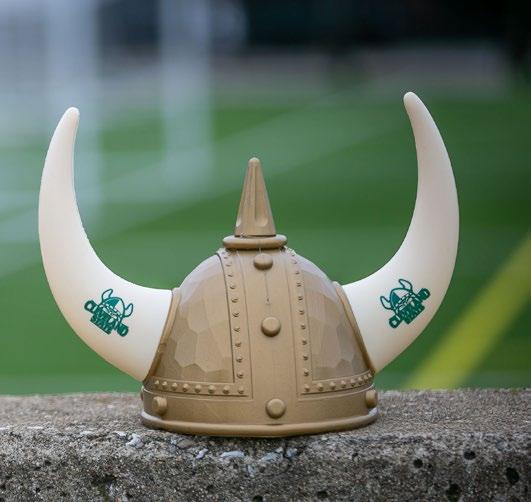

PLANNING YOUR LEGACY

YOUR LEGACY GIFT TO CLEVELAND STATE UNIVERSITY

Turn your passion for CSU into a lasting legacy. Establishing a legacy gift to Cleveland State University through estate planning can help you maximize financial goals, provide for loved ones, and meet your charitable aspirations of supporting CSU and our students for generations to come.
Estate planning is for everyone, regardless of age or assets, and is a strategic way for you to make a significant contribution that may not otherwise be possible during your lifetime.
Consider including CSU in your estate plans in a way that best meets your lifestyle and needs. When you do, you’ll be setting your support for CSU’s future in motion, today.

Successful gift planning is a creative process based on your goals and financial situation. There are a variety of legacy giving options to consider:
• Leaving CSU as a beneficiary in your will, trust, or retirement account
• Donating a life insurance policy
• Creating a life income stream through a charitable gift annuity
• Contributing through your IRA or donor-advised fund
Gift advantages can include a current charitable income tax deduction; a guaranteed lifetime income for you and/or your loved ones; savings on capital gains, income, gift and estate taxes; and of course, providing support to advance CSU’s mission.
In addition to being personally rewarding, the majority of legacy gifts are revocable. If your financial needs or philanthropic priorities change, your gift remains yours to use during your lifetime. Most legacy gifts are also affordable. While larger estates may require more protections, many people can make a legacy gift with little to no cost.
You can designate your legacy gift to the CSU Foundation to support a specific cause such as establishing a scholarship or professorship, building an existing scholarship, or supporting a

College or program. You can also allow the CSU Foundation to direct your unrestricted gift to where it’s most needed. Once you make your gift, you are inspiring others to do the same to support CSU, our programs and our students.
To learn more about planned giving options and tools, please visit the CSU Gift and Estate Planning website at plannedgiving.supportcsu.org or by scanning the QR code here.

The planned giving strategies presented in this guide summarize options for consideration. To determine what is best for you, your family and estate, it is best to consult with your attorney, tax advisor or financial planner. Our team at the CSU Foundation will work with your professional advisor in whatever capacity necessary. Gifts can be designated to the CSU Foundation:
Cleveland State University Foundation 2121 Euclid Ave, UN 501
Cleveland, OH 44115
Tax ID: 34-1316665

IRA CHARITABLE ROLLOVER
If you are 70 ½ or older, you can begin making contributions from your IRA directly to the CSU Foundation through an IRA Charitable Rollover, also known as a Qualified Charitable Distribution (QCD), and avoid paying income tax on the withdrawals. Beginning at age 73, making these gifts can satisfy all or part of your IRA required minimum distribution (RMD).
As the contribution is from your pre-tax assets and excluded from taxable income, this gift option is especially beneficial if you do not need the proceeds from your IRA or they would substantially increase your taxable income. You can still receive the benefits of such giving through your IRA whether you itemize or take the standard deduction. You can even establish a new CSU scholarship with contributions from your IRA or fulfill existing payments on a CSU pledge.
Under the Legacy IRA Act, you can make a one-time, taxfree distribution from an IRA account to establish a charitable remainder trust or gift annuity for an amount determined by IRS guidelines, receiving cash back throughout your lifetime.

DONOR ADVISED FUND (DAF)
Create a donor advised fund, make it the recipient of all your philanthropic contributions, and advise it to make grants when you want and to the organizations you want, including CSU. You receive an income tax deduction when you contribute funds to the DAF. A DAF can be established with a sponsoring organization or financial institution which invests your funds, and you advise how and when you want the funds granted. DAFs cannot return the funds to you, and you can only advise grants, although most institutions will follow your advice. DAFs offer a range of benefits.
• You can make gifts anonymously.
• You can centralize and time your charitable giving, receiving tax deductions in the year you prefer to make the donations, not disburse them.
• The DAF maintains record keeping for your charitable donations.

• Your administrator invests your DAF to grow, which will allow you to give more, for longer.
• You can name your children and grandchildren as co-advisors to the DAF, instilling a sense of family philanthropy and legacy.
• You can name CSU as a beneficiary of your DAF.
GIFTS OF APPRECIATED ASSETS
Donating appreciated assets, such as stocks, bonds, or real estate, can be a valuable tool in your charitable gift and estate planning. For example, if you decide to dispose of an appreciated stock, you will pay capital gains tax on the gain. However, making a current gift of appreciated stock to CSU has many potential benefits, including a charitable income tax deduction and the avoidance of capital gains tax. If you have held the stock for more than one year and it is greater in value than what you paid, you can deduct the fair-market value of the stock at the time you make the gift, not the lesser amount of what you paid.

BENEFICIARY DESIGNATIONS
Beneficiary designations are an easy, no-cost legacy giving option. You can simply list the Cleveland State University Foundation as a partial or full beneficiary on the designated forms for your bank account, IRA, 401K, annuity or life insurance policy. Then, please contact the CSU Foundation to inform us of your gift and how you intend it to be used. In addition, the taxes your heirs would likely incur if they inherited your retirement savings would be avoided if the assets are instead gifted to CSU.
CHARITABLE BEQUESTS
A charitable bequest made in your will is an easy method to provide support to CSU while leaving you free to use your assets during your lifetime. Once you create your bequest, please contact the CSU Foundation to inform us of your intention and how you wish your gift to be designated. Your charitable bequest may be:

LIFE INSURANCE
Significant tax benefits may be available by gifting unneeded life insurance policies to CSU, either by naming CSU as a beneficiary of a policy or transferring ownership of a policy to CSU.
• By naming CSU as a beneficiary of your life insurance policy, the value of the policy is removed from your taxable estate, potentially reducing your estate taxes.
• If you transfer ownership of a paid-up policy to CSU, you will receive a charitable tax deduction for the cash value of the policy. Otherwise, you will receive a deduction equal to the amount of premiums paid, known as basis. If you have owned the policy for many years, this could result in significant tax savings.
• You can continue to pay the premiums on the life insurance policy you transferred to CSU, or you can make annual, taxdeductible gifts to CSU to support the premium payments.

LIFE INCOME GIFTS
Life income gifts allow you to realize significant tax advantages and receive a life income stream for you or your loved ones, all while supporting CSU.
A Charitable Gift Annuity (CGA) can guarantee fixed payments for you and a beneficiary throughout your lifetime, with the remaining value of the annuity transferring to the CSU Foundation so you can leave a legacy.
To establish a CGA, you make a contribution to CSU of cash, securities or appreciated assets. CSU will provide you with a payout rate based on the size of your contribution, calculated on your age and a rate no higher than those recommended by the American Council on Gift Annuities (ACGA). You receive an immediate income tax deduction for a portion of the contribution determined by the value of the annuity, and tax-free portions are calculated on the annuity payments. You may avoid capital gains tax when you transfer appreciated stock to fund the CGA.

Charitable Lead Trusts distribute payments to CSU, and at the end of the term, the remaining assets are distributed to you and your family. You receive a gift or estate tax deduction at the time of your gift; your family will receive the trust assets plus any additional growth in value, at reduced or zero cost.
Charitable Remainder Trusts distribute payments to your beneficiaries, and at the end of the term, the remaining assets are distributed to CSU. Annual payments can be a fixed amount (Charitable Remainder Annuity Trust – CRAT) or based on a percentage of the trust corpus (Charitable Remainder Unitrust – CRUT). The term can be for your life or a set number of years. You receive an immediate income tax deduction for the charitable portion of the trust. If funded with appreciated assets, the trust will then sell the assets tax-free, and you avoid capital gains on the

GIFTS OF REAL ESTATE
Consider supporting CSU with a gift of real estate, ideal for those who do not plan to pass on property to their heirs.
• Bequest: Leave a property or the proceeds of its sale to CSU in your will or trust.
• Bargain Sale: Sell an appreciated property to CSU at a price less than fair market value; in turn, receive cash to reinvest for future income and an income tax deduction for your gift (the difference between the fair market value and purchase price). You will also avoid capital gains tax on your charitable gift.
• Reserved Life Estate: Deed your home or property to CSU while retaining the right to live in your home throughout your lifetime, as long as you agree to cover costs of maintenance, insurance and taxes. When you have passed, your home or property will belong to CSU, which will then use or sell the property to serve the purpose you stipulate in your Life Estate. It is possible to gift your property even if you are carrying a mortgage. You will receive a federal income tax deduction for the present value of the remainder interest. If, at some point in the future, you are no longer able to live in your home, CSU may be able to help you use your life estate to create a lump sum cash payment (with a joint sale) or create an income stream, using the life estate to fund a charitable gift annuity or trust.
TANGIBLE PERSONAL PROPERTY
Consider donating valuable assets to CSU such as artwork, historical artifacts, and books that you no longer want or need and receive an income tax deduction the year of the donation. Acceptance of the gift is determined by the appropriate program director or dean at CSU, and gifts valued at $5,000 or more must be accompanied by an appraisal from a qualified appraiser.
IN GRATITUDE
Donors who make planned gifts to Cleveland State University are recognized for their generosity through membership in the Legacy Society. Through the Legacy Society, CSU acknowledges and expresses gratitude for the generosity of individuals who have chosen to leave a lasting impact on the university through their estate plan.
Planned gifts are diverse and support CSU in numerous ways. These include providing financial stability and a strong future outlook, institutional growth and development, program enhancement, scholarship opportunities, student services, state-ofthe-art facilities and infrastructure, and ground-breaking research.
Planned giving donors leave their legacy to CSU while helping our students begin theirs. Get started with your estate plan by contacting us at the information below.
Constance M. Karapelou, BA ’87, MA ’02 Senior Director, Gift and Estate Planning
Cleveland State University 216.875.9838

c.karapelou@csuohio.edu plannedgiving.supportcsu.org
